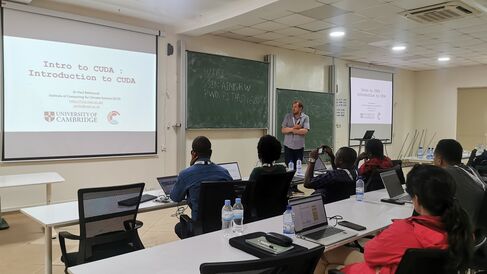
A select team travelled to Kigali, Rwanda to provide pre-conference training for the first ever World Climate Research Programme conference to be held in Africa.
Just days before 1,400 experts gathered to discuss the latest developments in climate science, ICCS delivered a hands-on session demonstrating practical tools and best practices in software engineering for climate research. Following this, the team spent the week meeting a variety of experts from around the world and presented in a short talk series alongside Schmidt Futures collaborative partners.
"It was extremely insightful to hear first-hand accounts of the effects of climate change from African researchers. Often discussions around climate change are presented as numbers like those for sea level rise, whereas here it was different. People personally understood what those numbers meant. When your hometown is destroyed, it’s no longer just statistics. That’s why it’s important to host these events in places where they are accessible for people who are more likely to be impacted by climate change." - Tom Meltzer
The training workshop
ICCS research software engineers (RSEs) taught best practices in software engineering to a classroom of researchers who represented almost 20 countries, many of whom had travelled from within the African continent. It was specifically aimed at early career researchers, serving to not only teach valuable skills, but catalyse networking opportunities for future collaboration.
The day included the following:
- A lightning round of introductions
- How to use Git and GitHub effectively
- An introduction to GPU programming
- Using types to rule out bugs: Python vs Fortran perspectives
The team ended the day with a troubleshooting ‘cafe’ where participants helped each other repair broken code and the RSEs helped solve specific issues.
The Virtual Earth Systems Research Institute (VESRI) Community
Within the larger conference, the team was able to connect with people working in the VESRI. VESRI teams operate under our shared sponsor, Schmidt Futures and collaborate with ICCS software engineers on various climate modelling projects year-round. In fact, two of the conference’s evening events were dedicated to VESRI teams to give short talks about their current research.
CALIPSO, a new VESRI team, presented their commencement of study on the loss of carbon in plants, soils and the ocean. This was especially interesting for the RSEs as they are likely to be working with them soon.
"CALIPSO is a new project for us and I'm excited to see how we can get involved. I’m sure there will be interesting projects on the horizon.' - Tom Meltzer
Impact
ICCS is grateful for the opportunity to participate in the conference, learning from such a diversity of experts. Over two thirds of participants from Global South countries and almost 500 participants joined from African countries.
"One of the women who came to our training was studying landslides and erosion. She told me her next-door neighbours had been killed by a landslide when she was a child. Her reasons were very personal and it was quite grounding." - Marla Fuchs
"Meeting with other research groups and sharing what we're doing helps us keep abreast of the latest science. We were also there to network with the modelling centres and people who were involved in CMIP. CMIP generates a wealth of data which is often then used to inform policy, e.g. future temperature projections across different pathways for the IPCC reports." - Dominic Orchard
ICCS extends a kind thank you to the generous and capable hosts as well as many thanks to our funders Schmidt Futures for sponsoring us to go to the event.
